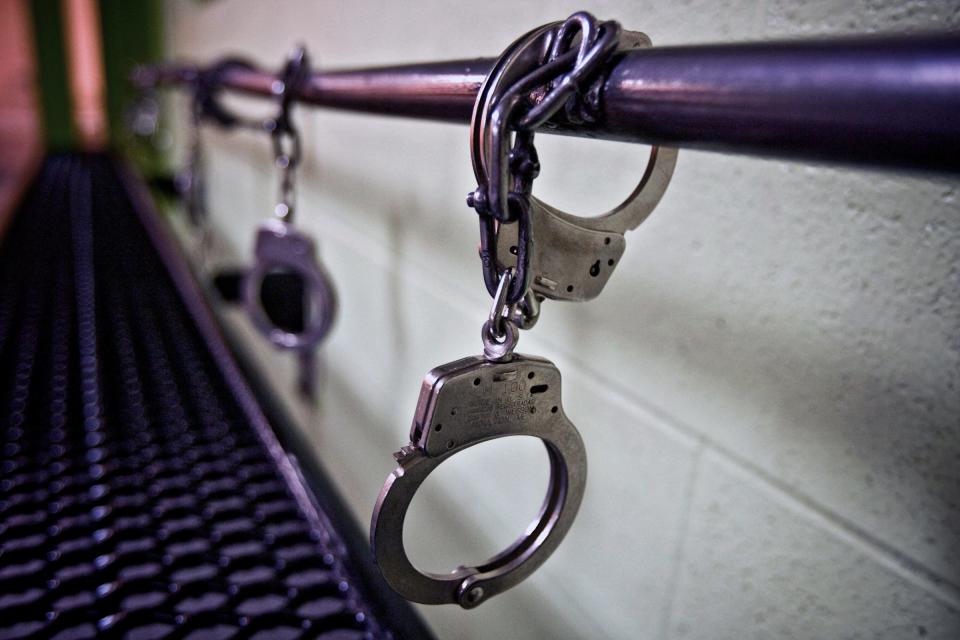Jail trust ditches private legal representation to use district attorney's office instead

Oklahoma County's jail trust will use lawyers from the district attorney's office to handle its future legal affairs, members decided Monday.
Members voted 6 to 0 to authorize District Attorney Vicki Behenna’s office to become the agency's counsel and assume control in defending it in all pending litigation against the Oklahoma County Criminal Justice Authority.
Assistant District Attorney Aaron Etherington told trustees the change could potentially impact a dozen pending cases filed against the trust.
The trust, currently with two open seats and trustee Chad Alexander absent, approved the change, voted to terminate its contract for legal services with Williams, Box, Forshee & Bullard and voted to end insurance policies that had paid for legal representation on trust liabilities involving commercial properties, automobiles and crime, as well as public officials' actions.
Oklahoma County Commissioner Myles Davidson did not attend Monday's trust meeting. However, his designated representative (Dawn Cash) cast votes supporting the changes.
Before the trust was established, Oklahoma County's district attorney represented elected public officials responsible for the jail's operation during civil suits involving alleged mistreatments of detainees.
In cases where the DA's office prosecuted an ex-jail employee in connection with allegations in a lawsuit, attorneys with its civil division would withdraw from representing elected leaders, Brook Arbeitman, communications director for Oklahoma County District Attorney Vicki Behenna said.
"We would handle it the same way we did when the sheriff ran the jail… our civil division conflicts out of the representation and private counsel is hired," she said.
Monday's decision was made before trust members entered into executive session to discuss two recent federal civil lawsuits it faces after the 2021 deaths of two detainees.

Case claims improper medical treatment led to Christa Sullivan's death
A case filed on April 6 in Oklahoma City federal court by Angela Leddy, Christa Sullivan's daughter, seeks compensation from the jail trust, Oklahoma County's board of county commissioners, Turn Key Health, Drs. Gabriel Cuka and Mark Winchester and nurses Stephanie Williams and Nancy Meyer.
The case claims the jail, Turn Key and its employees were negligent in caring for Sullivan, 65, who died inside the jail on April 13, 2021.
Sullivan had a documented history of mental illness, including schizoaffective disorder, bipolar type, anxiety and depression, leading her to attempt to harm herself and others and resulting in her receiving treatment in a behavioral health hospital in late 2019 and early 2020, the lawsuit states.
Oklahoma City police arrested her April 27, 2020, after she was accused of stabbing her husband. Sullivan was taken to the jail on a complaint of assault using a deadly weapon and was later charged.
During medical intake, Sullivan told a Turn Key nurse she suffered from anxiety, schizophrenia, insomnia, mitral valve prolapse, high cholesterol, hypertension and fatty liver disease. She also told the nurse she was experiencing auditory hallucinations.
While Turn Key and the jail put Sullivan on suicide watch until she could be evaluated further, she twice tried to kill herself. Subsequent evaluations by Turn Key personnel described Sullivan as being "sad" and exhibiting "severe" mental health symptoms.
Over the next 11 months, additional suicide attempts were logged by jail and Turn Key employees as Sullivan's mental and physical health gradually declined and she became catatonic, the lawsuit states.
The jail sent Sullivan to an area hospital for treatment twice in March 2021, first to be treated for a blood disorder, acute kidney injury, dehydration, vitamin D deficiency and a thyroid nodule. She was sent a second time after injuring herself during a fall.
Earlier that same month, the judge in her case had ordered a competency review for her be conducted in Vinita. But a lack of an available bed prevented that from happening.
"It was abundantly obvious, by at least March 18, 2021, that the Jail was not equipped to handle Ms. Sullivan’s severe and worsening medical and mental health conditions," the lawsuit states.
Leddy's lawsuit asks for more than $75,000 in actual and compensatory damages, plus interest, attorneys fees and court costs and punitive damages from Turn Key-related defendants.
"There were such gross deficiencies in training, supervision, facilities, practices, and procedures that Ms. Sullivan was effectively denied constitutional medical and mental health care," the lawsuit states.
Holding cell death denied detainee his rights, lawsuit claims
A case filed April 14 in federal court in Oklahoma City by Rachel Kimbrough on behalf of Lee Alexander Chouteau's estate also seeks money from the authority, Oklahoma County's commissioners, Turn Key and direct or contracted jail employees Lisa Hooker, Jeff Fitzpatrick, Rebecca Melton, Sinead Eastman, Melvin Wilson, Erin Byrd and John and Jane Does one through 10.
Chouteau was pulled over and arrested on a driving under the influence complaint by an Oklahoma Highway Patrol Trooper late June 23, 2021, after he failed a field sobriety test, the lawsuit states.
While being taken to the jail, Chouteau was unruly and experienced heightened delusions, and once there, resisted being moved from the trooper's vehicle into the jail and was forcefully taken to the ground several times, it states. Chouteau was found dead inside of a holding cell the next day.
Despite a booking officer's determination Chouteau needed a medical evaluation, either Turn Key wasn't notified or ignored the request, according to the lawsuit.
While jail records show site checks on Chouteau's cell were conducted periodically throughout the night and into the next morning on June 24, a detention officer did not enter the cell and attempt to rouse the man until nearly 4:30 p.m., only to find Chouteau unresponsive.
The medical examiner's report suggested he had been deceased for some time. The report also described contusions and abrasions scattered on Chouteau’s body.
More: Living Hell: The Oklahoma County jail
Choteau's death prompted an Oklahoma health department inspection, which reported jail records showed Chouteau received no state-required medical or mental health intake screenings.
Further, Chouteau's death caught the attention of the multicounty grand jury, which issued a report in March that detailed numerous problems with the facility involving inadequate controlled dangerous substance interdiction, inadequate health screenings during intakes and failures of detention officers to conduct proper site checks on inmates.
In addition, the grand jury determined the operation was woefully understaffed, that sight checks at the Oklahoma County Detention Center had been inadequate and “falsified site checks have led to deaths in the jail.”
"Jail staff knew Chouteau was arrested for a DUI, they knew Chouteau exhibited signs of intoxication, and they knew other officers had used force on Chouteau. The jail trust was responsible for training and supervising jail employees; adopting, implementing, and enforcing jail policies and for ensuring that the people in its custody received necessary medical care, as required under the United States Constitution and other laws.
"Prior to his death, Chouteau was awaiting his day in court, having neither been tried or convicted of the alleged crime for which he was arrested. As a pretrial detainee, he was entitled to the protections afforded by the Fourteenth Amendment to the United States Constitution," the lawsuit states.
Kimbrough's lawsuit seeks all available compensatory damages, including damages for Chouteau’s mental and physical pain and suffering, the loss of the value of his life, the mental anguish and grief of his surviving siblings and mother, all other compensatory damages available under state and federal law, plus punitive damages and any other relief the court deems equitable and just.
This article originally appeared on Oklahoman: Oklahoma County jail trust to use district attorney for legal affairs

